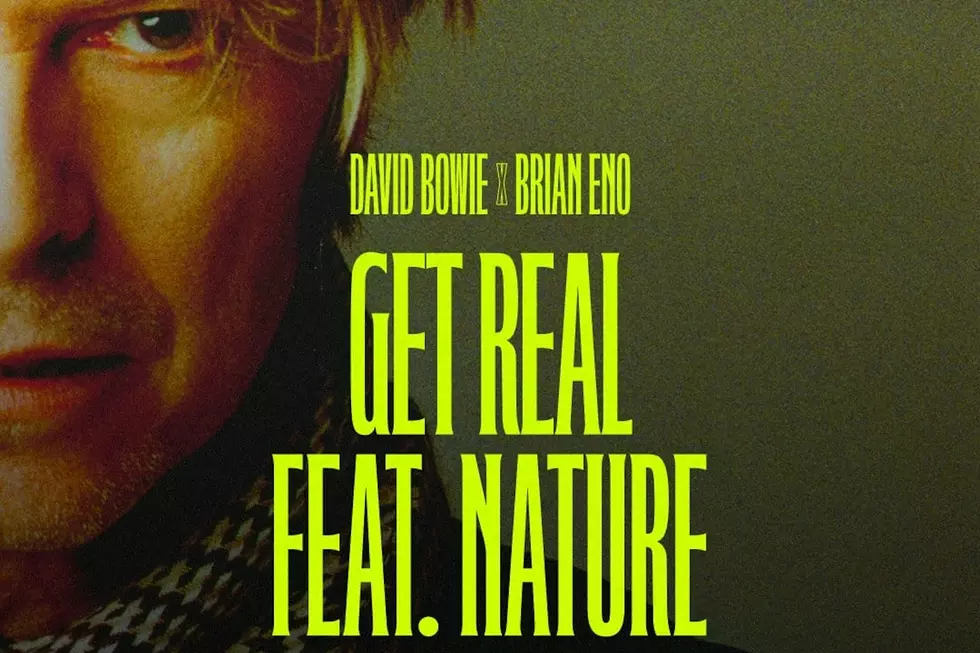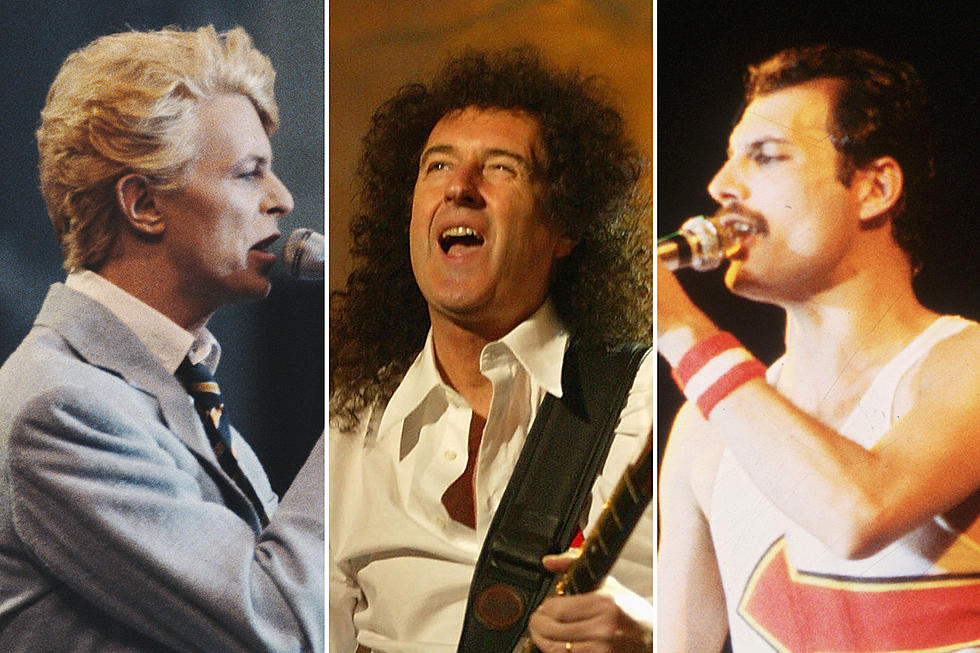
Marco Benevento Talks About David Bowie and His Mountain Jam Show: Exclusive Interview
On the first day of Mountain Jam, keyboardist Marco Benevento and Superhuman Happiness are set to do a tribute to David Bowie. The pairing makes sense: Not only have the two groups have been collaborating on a tribute set since last year when they covered Hunky Dory in full, but Benevento is also a huge Bowie fan and lived near him in upstate New York. (The annual Mountain Jam music festival takes place in Hunter, N.Y. on June 2-5 this year.)
"He was a local here in Woodstock, around the area," Benevento tells Ultimate Classic Rock. "I think my wife even ran into him at the school that his kid goes to. I never met him except for when I shook his hand and he gave me my [Berklee College of Music] diploma back in 1999."
Benevento — who recently released a new solo album, The Story of Fred Short, which features a seven-part movement borne out of a night of improvisation — spoke to us about his Bowie fandom, the Mountain Jam tribute and how the late rocker's influenced his career.
On when he became a Bowie fan
Surprisingly, not when he handed me my Berklee College of Music diploma in 1999. He was actually the guest speaker at my graduation, David Bowie and Wayne Shorter. At the time, I was way more into Miles Davis and jazz and stuff. I knew about him, but I was interested in different things at the time. And I was 21 and in music school.
I would say over the last 10 years, it's grown on me. I got Hunky Dory on vinyl, and I listened to that a hell of a lot. Then Ziggy Stardust — then I started collecting them all. Over the last three years specifically, especially since my kids are into David Bowie, we've been listening to him a lot. My kids want me to put their little record player in the bathroom when they're taking a bath so they can listen to Hunky Dory.
On his near-miss hanging out with David Bowie
I could've had lunch with David Bowie. Vinnie, my FedEx guy, calls me up one day. We just became friends because he's into music. He'd drop off a package, and I'd be like, "Yeah, it's this keyboard I got," and we started talking about music. I gave him a CD, and over the years, we had become friends. He calls me up one day, and he's like, "Hey, man, I just want to see if you want to have lunch." I was like, "Okay, Vinnie, FedEx guy, I'm good, man." He's never called me to have lunch or anything. I'm like, "No, man, I'm going to be on tour, but thanks for the call."
It's like, "Aw, man, I wish you'd come — I'm actually going out to lunch with David Bowie, and I wanted to see if you wanted to join me, because I knew you're such a fan." And I was like, "What?" [Laughs] For a split second, I considered trying to find a sub for my gig, and bailing on a decent gig, actually, just to have lunch with David Bowie. And I wish that I had followed through with it. But I didn't, because you can't bail on gigs — it's not a cool thing to do. But when David Bowie wants to have lunch, you might want to reconsider.
On Bowie's appeal as an artist
He's beyond inspiring — he's just so creative and writes great music and all his records are very different. He really embraces these characters. He's playing a part of the rock 'n' roller. He gets dressed up for the part and really saturates himself with his own imagination. It's very original and very unique, and oddly captivating. He's been huge and everybody's loved him for a long time, but I can imagine around that time [the '70s] a lot of people were almost slightly scared, like, "Whoa, what the heck is this guy doing?" It's very bizarre. That's how you can capture someone's attention for sure.
I watched this BBC documentary about him called Five Years. It seems like here and there every other year you learn something new about Bowie and about the records he made. Like, "Aw, s---, man — Rick Wakeman was the keyboard player on Hunky Dory! That's amazing!" It's like never-ending discovery with him. We listen to Blackstar quite a bit in the house. My daughters really like it, which is really odd to me, because it's very different. My oldest kid will be walking around singing [affects kid voice, singing lyrics], "I'm a black star!"
On the ins and outs of his Bowie tribute
I don't go crazy when we perform — I'm not all dressed up like he would be. I'm not really recreating his look per se. When we play, we're doing our own thing with it, my own thing with it. Which is pretty close to the original — we're not really doing a lot of interpreting. We're doing our own version of Bowie tunes.
This whole thing was actually sparked by this club in Brooklyn called the Knitting Factory. Last July, the Knitting Factory did a series where every band would come in once a month and play a record in its entirety. They asked me to do it, and our band chose Hunky Dory. We covered the entire record, and I figured out how to sing it, and had to move some keys around because David Bowie has a lot higher of a voice than I do at the moment. We worked out our own arrangements and figured out how to pull that off. Ever since then people have wanted us to try it again and do some more Bowie. This Mountain Jam thing came about from that gig. We wanted to do something different this year, instead of just playing my own set, so we put together the Bowie tribute.
On why he's drawn to Hunky Dory
I love the piano on it. There's amazingly catchy, [Top-]100-songs-of-all-time songs on that record. Like "Life on Mars?" and "Oh! You Pretty Things" and "Changes" — those three songs on one record. That's just ridiculous. There's so many slamming hits on there. And then there's "Andy Warhol," "Queen Bitch," "Bewlay Brothers" and "Kooks" and some deeper cuts. "Andy Warhol" is such a killer tune; I love playing that tune with my band. I like the production on it a lot. I like the brightness of the acoustic guitar. There's a lot of acoustic guitar on the record too, which is awesome. It's a pretty dry-sounding record. There's not a lot of reverb — it's all voice into microphone, first- or second-take-sounding songs. Very live and in the studio. I love there's a song about Bob Dylan; there's a song about Andy Warhol. The record is just incredible.
On collaborating with Superhuman Happiness on the Bowie project
The most gratifying part about that is when I hear them sing with me, and we're all singing, there's multiple voices happening at the same time. I love that. And also their own band is amazing. We've done some tours together, and we're friends. We've covered a lot of ground together over the last year or so. We appreciate each other's own band and music that we're writing. I love their records, so when we get together and collaborate, we're all on the same page, taste-wise. We all know what to do, intuitively, together. They play horns — Stuart Bogie's going to play some sax, and the other singer, Eric [Biondo], is going to be playing some trumpet. We get to have some other instruments involved.
On the lessons from Bowie's career he keeps in mind when making his own music
The big picture. Being true to your own artistic needs, and true to the music you want to make. That's the most important part about it, is being yourself and making your own art and making it yourself with the help of engineers and other musicians. But making your own s--- is the most important part as a musician, as an artist. As a dancer, as a builder, as anything — you don't want to be copying anybody else, you want to be doing your own thing. Of course, all music is derivative, so your music might be derived or inspired by something else. When you make it and do it all yourself, in the end, it's gong to have your own flavor to it. You might think it sounds like certain people, but most people think it sounds just like you. That's the biggest thing to get from it.
I've been pumping out my own records a lot — I just finished my sixth record. I'm in no way comparing my stuff to Bowie's stuff whatsoever, but I know the feeling of the output of music and you can't stop and you're just constantly searching and changing and writing. Your shows change drastically even a year later, or two years later. There's all this new music. I know the feeling of having to put out your own music, otherwise you're not really following your heart with your passion and your art.
And also more specifically, his attention to lyrics is really great. I've been writing lyrics only for the last two years, three years at the most. I just started singing, so I'm now opening the door into writing lyrics and singing and all that stuff. Most of our music was instrumental, but the last two records we've put out have all had singing on them. Specifically getting into Bowie's words is really cool, to dive into his poetry and learn his words and sing them. It's like, "Oh my God, I gotta get better at my lyric writing!" It's so imaginative and creative.
Every David Bowie Single Ranked
More From Ultimate Classic Rock









